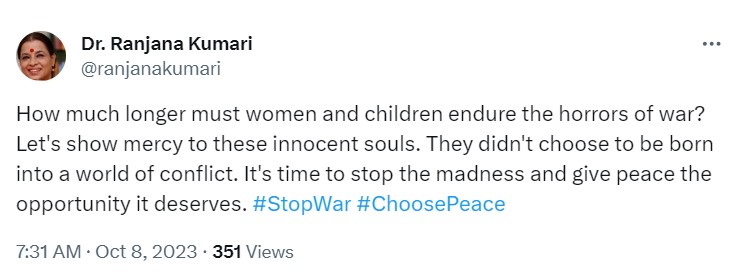
Maiden Factory Announces Participation in the 2023 Ocean Global Race: Empowering Women and Girls Worldwide
September 24, 2023
Unyielding Daughters and Resilience: A Triumph Against Violence on the International Day for the Elimination of Violence against Women
November 26, 2023In a world riddled with conflicts and crises, the role of women in promoting peace has become increasingly vital. Women’s involvement in peace-building efforts has proven to be not only beneficial but often indispensable, offering fresh perspectives, empathy, and innovative solutions to the complex problems that persist. While women have historically been underrepresented in peace processes and conflict resolution, the 21st century has witnessed a growing recognition of their importance. Today, with numerous conflicts and tensions prevailing across the globe, the inclusion of women in peace initiatives is more crucial than ever.
Throughout history, women have played essential roles in advocating for peace. Women-led movements, such as the Women’s International League for Peace and Freedom founded in 1915 and the Mothers of the Plaza de Mayo in Argentina, have had a significant impact on raising awareness about the consequences of armed conflict and the need for peaceful solutions. These movements were instrumental in influencing policies and garnering international support for peace efforts.
Women’s perspectives in conflict resolution are often distinct from those of men. They bring a focus on human security, empathy, and the wellbeing of communities. Women tend to emphasize dialogue, cooperation, and long-term sustainable solutions. Their unique experiences, as both victims and active participants in conflicts, allow them to connect on a personal level with the affected communities.
In many conflict zones, women are the primary caregivers and are deeply affected by the consequences of violence. They often suffer from displacement, loss of loved ones, and trauma. Their firsthand experiences give them an acute understanding of the devastating impacts of conflict on families and communities, motivating them to work towards peaceful resolutions.
The inclusion of women in peace processes is essential to ensure that the diverse voices of society are heard and represented. It is crucial for peace negotiations to involve all segments of the population, as women and men experience conflict differently. A more inclusive approach helps in crafting comprehensive and sustainable peace agreements that address the various needs and concerns of affected communities.
Moreover, women’s involvement in peace processes can foster greater legitimacy and acceptance of peace agreements. When women actively participate in negotiations and play a role in implementing the resulting agreements, it enhances the credibility of these accords in the eyes of the public. This leads to a higher likelihood of the agreements being respected and adhered to.
The prevention and resolution of conflicts require a multi-dimensional approach. Women play a pivotal role in identifying and mitigating the root causes of conflicts, often related to social, economic, and political disparities. By addressing these underlying issues, women can help reduce the likelihood of conflicts erupting in the first place.
In ongoing conflicts, women can serve as intermediaries and peacekeepers. They have a unique ability to build trust and bridge divides in highly polarized environments. Women-led peace initiatives have been successful in many regions, from Colombia to Northern Ireland, by fostering dialogue and reconciliation between warring factions.
Peace and security are intrinsically linked with human rights and gender equality. Women’s participation in peace processes helps advance gender-sensitive policies and ensures that the rights of women and girls are protected. By promoting gender equality, women contribute to the overall stability and prosperity of societies.
Women’s involvement in peace-building can also serve as a catalyst for addressing broader social issues, such as violence against women and discrimination. When women participate in peace processes, they can advocate for reforms and changes that promote gender equality and the eradication of gender-based violence.
The world today faces numerous conflicts and crises, from regional conflicts in the Middle East to ongoing tensions on the Korean Peninsula. In these turbulent times, the importance of women in promoting peace cannot be overstated. While there have been positive developments in recent years regarding the recognition of women’s roles in peace processes, there is still much work to be done.
For example, the inclusion of women in peace negotiations has been inconsistent, and their representation in decision-making roles remains disproportionately low. To harness the full potential of women’s contributions to peace, it is essential to remove barriers to their participation and provide opportunities for them to take on leadership roles.
The inclusion of women in peace-building efforts is not merely a matter of gender equality; it is a matter of practicality and necessity. The unique perspectives, experiences, and skills that women bring to the table are indispensable in resolving conflicts and building lasting peace. In a world beset by conflicts, we must recognize and value the critical role of women in promoting peace and security. Their contributions can lead to more comprehensive, enduring, and just solutions to the challenges that persist on the global stage. As we move forward, let us continue to work towards a more inclusive and peaceful world by empowering and engaging women in all aspects of conflict prevention and resolution.





